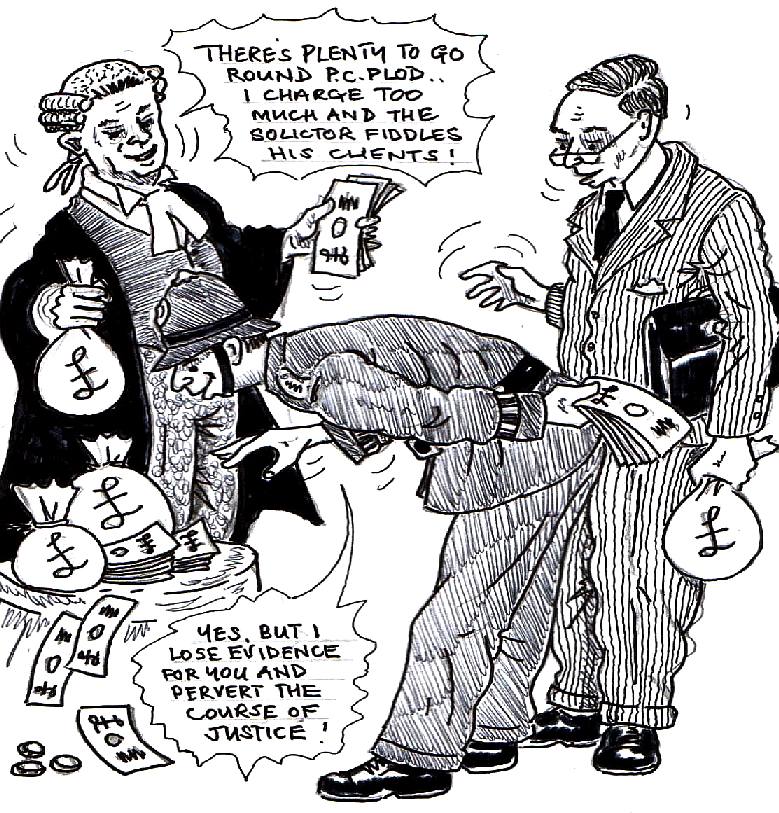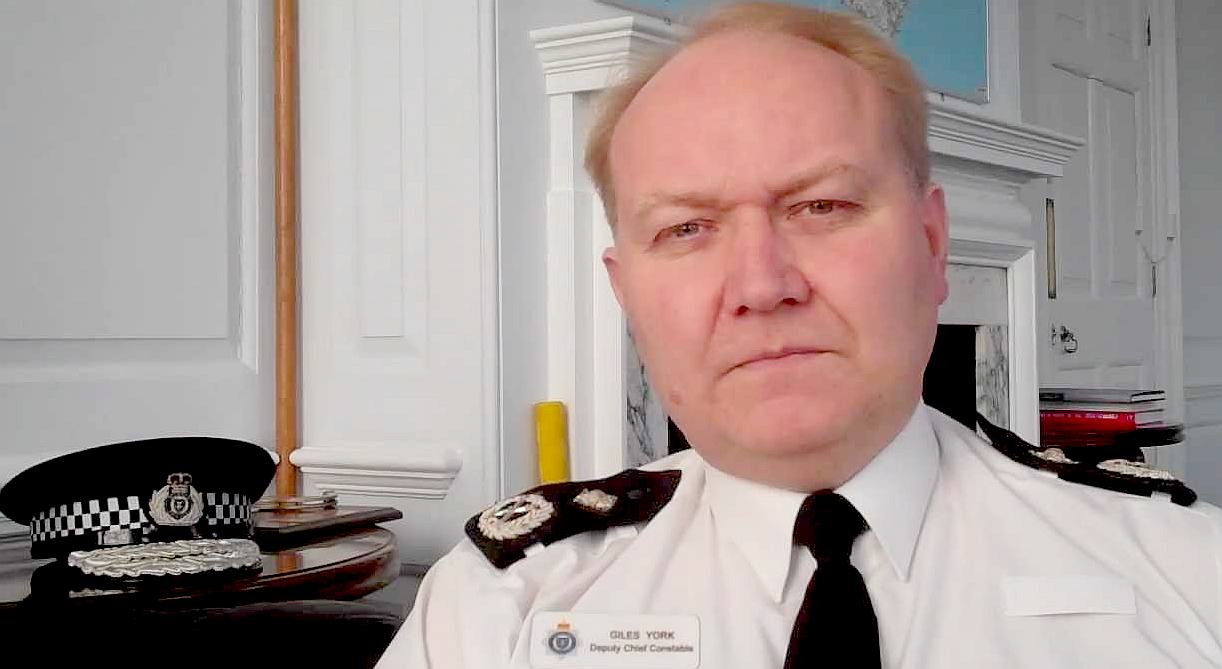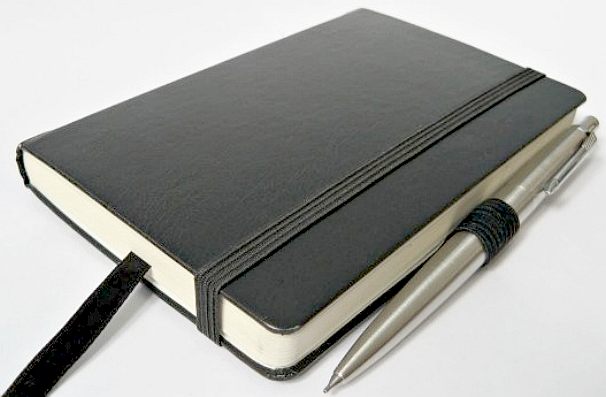|
VALENTINES DAY DIARY ENTRIES
HOME | CASE STUDIES | HISTORY | LAW | POLITICS | RIGHTS | SITE INDEX
|
|
DANGEROUS - It takes a team to gain a wrongful conviction. It starts with the police investigators and bias. They only look for evidence to convict. Then we need the CPS to charge the victim, based on the one-sided evidence, or rather lack of evidence. The CPS must then obstruct the defendant's legal team in disclosure to drain his Legal Aid funding. The prosecutor need not be a willing accomplice, but must be made to believe that she is prosecuting a sex offender. The Judge must also be made to think the same, when he is likely to control the trial to ensure that the defendant is disadvantaged. He will refuse all applications and push through the case as quickly as possible, especially for a brother mason. But before any of this can take place, they need an emotionally disturbed child who is out for revenge. Social services, and her teachers must be willing to bend the rules to coach her to create a story from nothing, that is likely to convince a jury - in the absence of any evidence to the contrary - and for that you need a defence solicitor and barrister who are not prepared to fight to defend their client, and willing to lie to him about securing expert evidence as to penetration, saying that Legal Aid will not fund it.
In the case of Nelson Kruschandl Vs Regina, Gordon Staker, Jo Pinyoun and James Hookway were investigation officers sent to gather evidence to convict Mr Kruschandl of an assumed crime of sexual assault that we believe to have been a trumped up allegation, when it appears that Sussex police ignored diary evidence in connection with the sending of Valentines Day cards to his then fiancée and daughter - thus violating the Criminal Procedure And Investigations Act 1996 (Code of Practice) Order 2015.
Given that they knew the date of the sending of these card(s), and given that the card(s) formed one of the key pieces of evidence in the case, as relied on by the prosecution, you would have expected that Gordon Staker, Jo Pinyoun or James Hookway, as officers of the law, would have been duty bound by the code of conduct to see what was in the diaries of the accused on those days.
We feel sure that the curiosity of these officers would have meant that they read the diaries of the accused, but that having seen the entries, realised that the accused (defendant) had been asked by his partner, a cunning Community Psychiatric Nurse, not to forget Valentines Day. There was not one entry, there were similar entries for consecutive years, meaning that there was a pattern that if the mother of the complainant had objected to, would surely not have led to a further diary entry inviting similar customary exchange. The diary entries are in the hand of the complainant's mother. She has access to his desk diaries and took the liberty of writing in them to remind the accused about things to do for her.
The defendant, Mr Kruschandl, being dutiful and fulfilling his part as a caring partner, duly sent Valentines Day cards to his soon to be wife and her daughter, where he had been requested to do so. Also, sending flowers and taking his then fiancée, a daughter of a prominent mason out for a romantic dinner.
Giles York is the chief constable of Sussex Police taking over from a long chain of chief constables, including Paul Whitehouse, who was finally forced to resign after the Home Secretary insisted that he should go for bringing the force into disrepute from his attempt to cover up the Jimmy Ashley murder. Each time one chief resigns, the next candidate learns from the mistakes of his predecessor and makes effort not to be tripped up in the same way. Unfortunately, that is not helping the situation, where in-effect Mr York has nobody looking over his shoulder to make sure that he is not breaking the law. The most common way of breaking the law, is simply doing nothing when a crime is reported - so becoming party to the crime, as with the Petition scandal in 1997. Malfeasance in public office carries a maximum sentence of life imprisonment.
THE NURSE'S WORK DIARY
In a similar vein, it appears that concerning her own diaries, that Gordon Staker or other officers may have told the complainant to hide any inconvenient evidence, such as her work diaries, in this case as it transpired in her loft. The nurse, who lived at Hailsham at that time only revealed the existence of her work diary on the stand while giving evidence. It would never have come to light had she not been caught out lying by a text message that she sent to the accused and had thought had been erased that contradicted what she'd just said to the court on oath. If this had not happened the defence would not have found out about the existence of her work diary, or that she had hidden the diary in her loft. Or her explanation as to not mentioning her diary before to the investigating officers - when asked why she'd kept it a secret. She said: "I wasn't asked."
But, as a community psychiatric nurse she knew full well the value of written notes as evidence. She has left notes on her desk for the investigating officers to find and not hidden these, because she wanted them to find those. The reason being that she knew it would urge them on to a prosecution, which may have been revenge motivated for the accused calling off their engagement.
The importance of her work diary was that it proved a lack of opportunity. The police must have realised this fact and further concealed evidence as to menstruation cycles where the nurse claimed her daughter (the complainant) had not visited the defendant's home when she was having her period. But that cannot be the case when one examines the dates. So it is that the police deliberately supplied monochrome photocopies of selected pages, knowing that colour copies would reveal another weakness in the prosecutions case.
THE DEFENDANT'S DIARIES
Returning to the diary entries in the defendant's diaries, his then fiancée appears to have set up our hapless defendant, also keeping the Valentines Day cards she obtained in order to use them when the relationship hit hard times.
Where these police investigators turned a blind eye to the inconvenient entries, our victim provided them to his legal team, realising the importance of the fact that his former lover had invited him to send her and her daughter these cards. She even told him to make them saucy by way of a bit of fun to tease her daughter. Naturally, where the jury were not shown these diary entries, they had no idea that the defendant had been set up.
Why then would the defendant's legal team not introduce these diary entries as evidence? They were handed to Tim Stirmey and Julian Dale in a paginated bundle complete with an index at the offices of Cramp & Co in Eastbourne.
The only reason we can think of is that the solicitor and barrister were in some way connected with the police and/or crown prosecution service via the masons. More than likely the Tyrian Lodge in South Street. Julian Dale was not a London lawyer, he operated from a local chambers in Eastbourne.
The CCRC knew about the diary entries when the case was referred to them for investigation, but they did not investigate at all. You can see for yourself the importance of the evidence that Julian Dale neglected to use from Section 2 of the evidence bundle presented to him by the accused. Why would Mr Dale not have used this evidence when he could see the effect the valentine card was having on the Jury, but he had the information at his fingertips to show that the accused was simply doing as he was asked by his then Community Psychiatric Nurse partner.
NEGLIGENCE: If your legal team do not mount a full defence, your right to a fair trial as per Article 6 may have been compromised. If the police craft the evidence and your legal team do not challenge the crafting or pursue evidence that their client has given them to rebut the prosecutions case, then your solicitor and barrister have probably cooked up a deal with the police and are more than likely to be masons or have masonic connections. If this is what has happened then malfeasance is more than likely to have occurred where the police hold positions in public office and conspiracy to pervert the course of justice may also be included on your list.
PAUL WHITEHOUSE & JOE EDWARDS
As to the integrity of Sussex police and their chief constables, we should look at the investigation of the shooting of James Ashley under the lead of Sir John Hoddinott.
The Wilding report found a complete failure of corporate duty by Sussex
police. The
Hampshire inquiry concluded that three police officers lied about intelligence in order to persuade Deputy Chief Constable Mark Jordan to authorise the raid. The report found that the raid was
The report also showed that the guidelines on firearms put together by the Association of Chief Police Officers was breached. Experts on firearms and the law told
Kent police that even if the intelligence had been correct, the firearms should not have been authorised.
CONTACT SUSSEX POLICE
KATY BOURNE - Was elected Crime Commissioner, taking office with an oath to serve the public interest. That is an oath that many are now questioning, where she appears to be serving Sussex Police instead of policing the organisation that has come under such flack for their blatant refusal to investigate so many complaints of malfeasance in public office an example of which is the Petition in 1997 where police officers failed to mount any kind of investigation, did not interview any of 12 unrelated informants and failed to interview under caution any of the accused members of staff at Wealden District Council.
SUSSEX POLICE A - Z OF OFFICER INVESTIGATIONS
This site is protected under Article10 of the European Convention on Human Rights and Fundamental Freedoms.
FAIR USE NOTICE
This site contains copyrighted material the use of which has not always been specifically authorized by the copyright owner. We are making such material available in our efforts to advance understanding of environmental, political, human rights, economic, scientific, and social justice issues, etc. We believe this constitutes a 'fair use' of any such copyrighted material as provided for in section 107 of the US Copyright Law. In accordance with Title 17 U.S.C. Section 107, the material on this site is distributed without profit to those who have expressed a prior interest in receiving the included information for research and educational purposes.
For more information go to: http://www.law.cornell.edu/uscode/17/107.shtml. If you wish to use copyrighted material from this site for purposes of your own that go beyond 'fair use', you must obtain permission from the copyright owner.
Paul Whitehouse (1993-2001) Ken Jones (2001-2006) Joe Edwards (2006-2007) Martin Richards (2008-2014) Giles York (2014 >>)
|
|
This site is free of © Copyright except where specifically stated 2018. Any person may download, use and quote any reference or any link, and is guaranteed such right to freedom of information and speech under the Human Rights and Freedom of Information Acts. However, be aware that we cannot be held liable for the accuracy of the information provided. All users should therefore research matters for themselves and seek their own legal advice and this information is provided simply by way of a guide. Horse Sanctuary Trust. All trademarks herby acknowledged.
|







